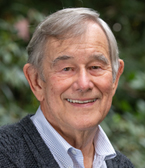This is the last issue of Education Next for which I will serve as editor-in-chief. In an era when many magazines have disappeared from newsstands, it is an honor that so many of you continue to find the journal’s material worthy of your consideration.
It has been a great ride. And the road into the future promises to be no less exciting, as leadership of the journal passes to Martin West. An associate professor at the Harvard Graduate School of Education, research fellow at the Hoover Institution, deputy director of Harvard’s Program on Education Policy and Governance, and, when Congress was drafting the Every Student Succeeds Act, a senior policy advisor to the ranking member of the U.S. Senate Committee on Health, Education, Labor, and Pensions, Marty stands tall within the education research and policy communities. I cannot think of anyone better qualified to assume this post.
Marty will collaborate with the journal’s stellar editorial team. Matthew Chingos of the Urban Institute will take Marty’s place as the executive editor with special responsibility for the journal’s research section. Especially important, Amanda Olberg, our managing editor, will continue to oversee the vicissitudes of the editorial and production processes. I look forward to working with the team in my new role as senior editor.
Education Next’s 17-year journey began in 2000 when Jay Greene, now at the University of Arkansas, insisted that K–12 education needed an independent voice. From the very beginning, the journal has been a joint venture, with multiple perspectives and diverse sources of support. The Hoover Institution at Stanford University agreed to publish the journal, and the members of its Koret Task Force on K–12 Education unanimously agreed to serve as the editorial board. Chester E. Finn, Jr., committed Fordham Foundation resources and signed on as senior editor. Fordham’s Marci Kanstoroom, also with us from the start, became an executive editor. Carol Peterson left her position at the Harvard Graduate School of Education to serve as managing editor for the new start-up. Several foundations put the journal on a strong financial footing, while the Taubman Center for State and Local Government at the Harvard Kennedy School provided space and logistical support.
There were bumps along the way, of course. Our first two issues appeared under the moniker Education Matters, a title to which a consulting firm took exception, even though it had never registered the name as a trademark. As a result, the second issue’s publication was delayed. Some of the feistier members of our team wanted to take the battle to court, but wiser heads realized that lawsuits ordinarily produce two losers, whatever the official outcome. The new title, Education Next, has served us well.
Early on, three new executive editors were brought on board: Marty West, who assumed responsibility for the journal’s research section; Rick Hess, director of education policy studies at the American Enterprise Institute, who has taken charge of the forum and book review sections; and Michael Petrilli (now president of the Thomas B. Fordham Institute), who along with Marci Kanstoroom, still serves as editor of the features section. When we realized that digital learning was coming next, Michael Horn, co-founder of the Clayton Christensen Institute, joined the editorial team.
Ten years ago we launched the first annual Education Next survey of a representative sample of the American adult population, and it has blossomed into an institution in its own right. Marty West, William Howell, and Michael Henderson have helped make this happen.
In 2009 the Education Next web site was dramatically reconceived, expanding the journal’s online audience nearly sevenfold over the next seven years. Our web team, guided by Marci Kanstoroom, ensures that the web site has fresh content daily. Our designer, manuscript editors, and media officers make certain the content is well prepared and reaches the widest possible audience.
I am in debt to the many members of our team, as you can see, but I owe the most to you, dear reader. Thank you for your support.
—Paul E. Peterson
